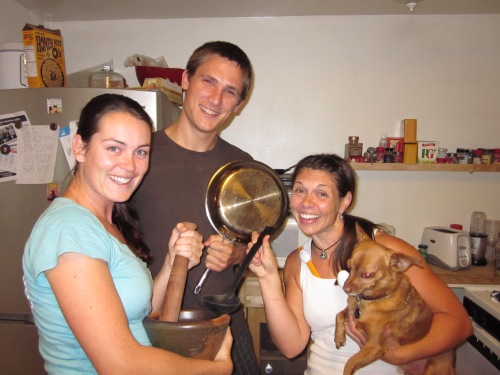Last December, I separated from my husband. We’d been married for two years and had lived together for almost four years. I remember ruefully telling a friend, as I flailed through the rough seas of transition, “I can’t imagine having roommates again, after all this time and not at my age.”
In hindsight, the statement seems strange, as though someone that I didn’t know had said it. But at the time, it made sense. I’d lived with romantic partner for years, and my roommate experience before that had been rocky and had ended badly. I’d grown to love the easy companionship of living with my partner, the way that routine seemed easier to come by, and how it felt like I could just be myself in our shared domestic space. Having roommates seemed like something people do in their twenties. As someone with a firm belief in the power of community, this bourgeois attitude now surprises me. But something was ingrained. A sneaking voice whispered, “you’re 37 years old. You are a professional woman. If you are not married with kids, then you should live by yourself. Get it together.”
[image_1_big]
And so I set out to find a place of my own, and was stoked when a studio opened up in my first-choice neighborhood. It was a converted garage, with a box-sized bathroom and a shower that was actually in the doll-sized kitchen, next to the mini- stove and refrigerator. This was very European, I told myself. The studio was off the street and private, surrounded a sweet garden, right off the bike path, near downtown and biking distance from my work. It seemed perfect and so I proceeded to start my new life, living alone.
At first, I reveled in the independence. I loved to cook the foods that I liked in the kitchen, to sing out loud, and to do things on my own time. But after a few months, a sense of isolation began to take its toll. I hated coming home to a dark, silent house after a night out with friends. My neighbors were rarely home and I often felt nervous making my way into the badly lit backyard, waiting for the shadows to jump out and attack. I have a dog, and the guilt set in about the long hours he spent alone in the studio while I went to work. The breaking point came when I spent an entire weekend alone, suffering through a bad cold and unable and unwilling to reach out to anyone. The phrase “I could disappear, and no one would know,” ran through my head.
A couple of weeks later, I went out for beers with an old friend from graduate school. She mentioned that she was getting a house with two other people — a couple. I asked her for more information, and when she told me their plans for the house — gardening, home-brewing, cooking together, shared grocery shopping trips — I grew increasingly excited. They were looking for a fourth roommate and by the end of the night, I was in. My lease at the studio was up in a couple of months, I was still separated from my husband, and I was ready to start sharing resources again, and maybe conquer my loneliness.
Across America, the decision to take on roommates beyond the twenties is becoming more the norm as the economy flails and society moves steadily towards increased resource-sharing. According to the Census Bureau and the Department of Labor, from 2009-2010 the number of thirty-somethings living with non-family roommates rose from 10.6 million to 12 million, an increase of 13 percent. And the numbers only continue to rise as adults take on roommates to help pay the rent on exorbitant mortgages.
But what we might not realize is how living with others is beneficial to not only finances, but also to physical well-being. Little did I know that the loneliness I was experiencing on a daily basis in my tucked-away studio was actually bad for my health. University of Chicago psychologist John Cacioppo has spent many years tracking the effects of loneliness, according to a 2003 article in Psychology Today. Cacioppo found that loneliness leads to higher rates of depression, alcoholism and even suicide. Most dramatically, diminished interaction with others can raise levels of circulating stress hormones and levels of blood pressure, a condition that can lead to heart disease and strokes.
Annamarie Pluhar, author of Sharing Housing: A Guidebook for Finding and Keeping Good Housemates writes that sharing housing is a growing trend amongst people beyond college age. She says that some of the reasons for sharing housing are additional income, social connection, extra hands, and living light on the earth. “The myth of a self-reliant, independent person is a pervasive America story,” writes Pluhar. In a recent interview with the Boston Phoenix, Pluhar claimed that the American consciousness is shifting when it comes to ownership and “recognizing that if we do something together it works out better.”
From my own experience, this is most definitely true. I felt an instant sense of relief when the decision to rent with others was solidified. Within two months, my future housemates and I found a house just up the street from my studio and before I knew it, I was trucking my belongings into our new shared space. Within a couple of weeks of moving in, my roommate Alex had put in garden beds in the backyard and planted squash, tomatoes, basil, lettuce and chard. A hammock was strung between a backyard pole and a tree for all of us to enjoy. He rebuilt the deck with the help of his dad, making it more user-friendly for the household.
Alex and Christie are married, in their mid-twenties, both instructors at a local martial arts school. They brim with enthusiasm and ideas and they have a large community to draw on, and that community came through in the setting up of our house. Within a month, we had furniture, a home-brew station set up in the garage, and a kitchen that was constantly being used for shared and individual meals and chats over wine. My roommate Heather is my age and we have a lot kitchen conversations about what it means to be in our late thirties and not be on the “normal track.” She also has a dog, so we share dog-walking responsibilities and care (and dog food), which has been incredibly helpful.
The four of us have made sure to have house meetings once a month where we talk about shared cleaning duties, bills, the proper ways to wash and dry the knives, and how to keep the compost and garden in bloom. These help us maintain clear and open communications and allow us to bring up any issues before they turn into resentment fests . I’ve never lived in a roommate situation where we actually communicate in such a pro-active manner before, but I knew from conversations with my housemates, before we moved in together, that these were people who were capable and willing to have these types of discussions — without getting defensive. And that made living with them very appealing. Granted, the house isn’t spic and span, or perfectly organized by any means, but the fact that we all have a zone to take care of (this month mine is dusting and picking up the common areas) means that everyone makes a specific contribution to the house, which helps to keep the urge to just “let things go” in check.
There are still internal struggles, I must admit. I sometimes wish to be on my own, and that’s when I know to retreat to my room where I can write and read, all with the soothing sounds of other people busying themselves around the house too. The silence isn’t so deafening anymore. And I still sometimes struggle with the fear that there is something wrong with me because I’m in my late thirties and not living with a “partner.” I’m hoping that with time, that notion will fade, and I will be able to fully live in the happiness of sharing my space with others, not trying to make it on my own. I was willing to trade my sense of privacy and preconceptions of adulthood for lower rent, companionship and shared responsibilities, and in the process I’ve had to interrogate what being an adult even means anymore. Because, yes, the idea that adulthood is synonymous with self-reliance and individualism and “making it on your own” is only something that hurts us in the end, that isolates us from each other.
I posted a question about whether it was “pathetic” to have roommates in your late thirties on Facebook and received quite a few interesting responses. My cousin, a professional in her early forties who has had a roommate for years and has saved a busload of money responded “There is nothing pathetic about it! The world is changing. Growing up, getting married, having kids, buying a house, and going into debt is not the way we have to live our lives anymore. The rules of the game are changing!”
Really, there is nothing pathetic about sharing resources with a group of like-minded people. If anything, we are at the forefront of a brave, new world. A world where seniors are choosing co-housing villages over bland retirement communities, where open learning communities are decommodifying education, where car-sharing and coworking spaces are becoming the norm, and where choosing roommates beyond the twenties is a sign of being wise enough to recognize that individualism is overrated — and most definitely isn’t a marker of having “made it” in the world. In fact, I’m learning that cultivating the ability to work and live with others in a way that ensures the well-being of everyone involved, while sharing resources and respecting individual needs is the new paradigm — the true sign of being a real grown-up.









